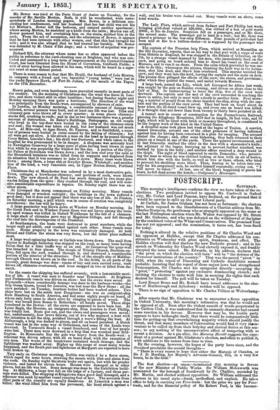POSTSCRIPT.
SATURDAY.
This morning's intelligence confirms the view we have taken of the re- elections. Two gentlemen invited to oppose Mr. Cardwell in Oxford city, Mr. Corbet and Lord Duncan, have declined, on the ground that it would be unwise to split up the great Liberal party. At Carlisle, Sir James Graham has not been so fortunate : the electors have been exposed to the blandishments of a Chartist address from Mr. Charles Sturgeon, the, gentleman who so strangely appeared on the scene at the last Nottingham election when Mr. Walter was opposed by Mr. Strutt and Mr. Gisborne, and who was defeated on the withdrawal of the latter by the combined votes of the Whigs and Conservatives. The promised Tory has not yet appeared ; and the nomination, it turns out, has been fixed for today.
Nothing is altered in the relative positions of Sir Charles Wood and his opponent at Halifax, except that Sir Charles addressed his con- stituents on Wednesday with great spirit, frankness, and effect. The Halifax election will first disclose the new Derbyite ground ; and in his speech on Wednesday Sir Charles Wood cleverly exposed it, and frankly accepted the issue raised. Mr. Edwards, in his address, declares that "the pivot on which the election will turn" will be "the defence of the Protestant institutions of the country." That was the sacred "pivot" in 1826, when the repeal of Dissenting and Catholic disabilities seemed probable. Insisting that the repeal of those unjust laws had strengthened Protestantism, Sir Charles met his antagonist directly--accepting the "pivot," " protesting " against any exclusive domineering church ; and inviting the electors to unite with him in securing the rights that each desired for himself. The poll will be taken on Tuesday.
Lord Ernest Bruce and Mr. Bethel have issued addresses to the elec- tors of Marlborough and Aylesbury : neither will be opposed.
There is no sign of opposition to Mr. Charles Villiers at Wolverhamp- ton.
After reports that Mr. Gladstone was to encounter a fierce opposition in Oxford University, this morning's intimation was that he would not be opposed at all. Soon after the violent assault of words perpetrated in the Carlton Club, it was understood that its unmanly character had caused some reaction in his favour. However that may be, the hostile party appears to have bethought itself, that there would be comparatively little time for getting-up that overwhelming majority which should justify the threat, and that many members of Convocation would find it very incon- venient to be called up from their holyday and clerical duties at this sea- son; to say nothing of the unconservative effect of tampering with so recent a decision. As a pis eller, the Morning Herald suggests the expe- dient of a protest against Mr. Gladstone's election, and offers to publish it, with additions to the names from time to time.
By the evening, however, the hopes of the party have risen, and the Standard proclaims the second thoughts—
"There is every reason to hope that either the Marquis of Chandos, or Sir J. D. Harding, her Majesty's Advocate-General, will, in a very few hours, be in the field."
































 Previous page
Previous page